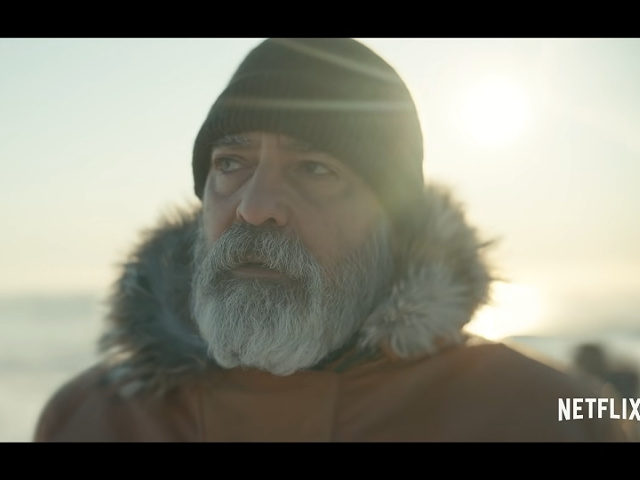Director/star George Clooney’s The Midnight Sky, an alternately moving and exciting mediation on the apocalypse, is now available to stream on Netflix.
The year is 2049 and something in the air is killing everyone and everything on Earth. Whatever it is (we’re never told), it spreads like a radiation cloud (which it might be) and will soon consume the whole planet. It’s literally the End of the World, and after having come to terms with that fact, a scientific base in the Arctic is being evacuated so everyone can go and be with their families. Left behind is Augustine Lofthouse (George Clooney), a scientist whose obsessive dedication to his work has ensured he has no one to go home to.
Lofthouse is also terminally ill, in need of weekly dialysis-like treatments, and now alone in a sleek base that probably could have sustained him forever. There’s plenty of brown cereal, he can give himself the blood treatments, and I’m assuming that by 2049, we’ve moved beyond diesel generators. The only problem is the approaching death cloud and the Aether, a spacecraft returning from a deep space mission.
The Aether’s crew has no idea the surface of the Earth is mostly toxic and will soon be entirely toxic. In order to save them, Lofthouse must make his way across the Arctic to a weather station with stronger communications equipment. Along for the adventure is Iris, a little mute girl left behind in the rush to evacuate.
The five-person crew of the Aether has its own problems. They have no idea why Earth keeps sending them to voice mail, Sully (Felicity Jones) is out-to-here pregnant, Mitchell (Kyle Chandler) and Maya (Tiffany Boone) are beyond homesick, and after being blown off course, meteor showers are a real possibility.
The Best Movie George Clooney’s Ever Directed By A Mile, is based on Lily Brooks-Dalton’s novel, Good Morning, Midnight, and reminded me of a lot of other movies, namely The Martian (2015), Solaris (2002), On the Beach (1959), and a couple of other titles that would act as spoilers. Nevertheless, this in no way takes anything away from The Midnight Sky, which is engrossing, moving, and pretty intense when things get hairy.
Best of all, it’s one of those movies where, at the end, everything comes together beautifully and does so in a way that adds deeper meaning to everything that came before.
Thankfully, there’s nothing political about The Midnight Sky. It’s a story filled with humanism, and whatever that thing is that’s wiping out the Earth, it’s sure not Global Warming. There are no woke moments, none of that spell-breaking garbage. Clooney focuses only on his characters, on their problem-solving, and courage — on exploring their relationships and how the promise of new life in the form of a baby is a joyous event, and not just for the parents.
The tonal shifts between the Arctic and outer space work beautifully. Lofthouse is a doomed and lonely man hiding behind Mel Gibson’s gloomy beard in a cold and desolate place with only regrets to keep him company. The crew of the Aether is an extended family (including a married couple) who represent the best of humanity, including our aspirations.
The performances, especially Clooney’s, are uniformly excellent, as are the special effects, most especially a spacewalk.
Although The Midnight Sky is a Netflix movie, it was obviously meant to be seen on a big screen. The scale, particularly in space, is close to epic, as is the budget. I watched it on a hi-def projector that filled a wall, but the story is grounded enough it should play just as well on any size TV.
There are some massive plot holes. For instance, after things go bad on Earth, why did a family member leave a message for the Aether crew, but not NASA? Would everyone flee the Arctic (which will be the last place hit with the poison)? Also, the score is a little overbearing at times.
The Midnight Sky is no classic. It is, though, a very good movie and well worth your two hours.
Follow John Nolte on Twitter @NolteNC. Follow his Facebook Page here.

COMMENTS
Please let us know if you're having issues with commenting.